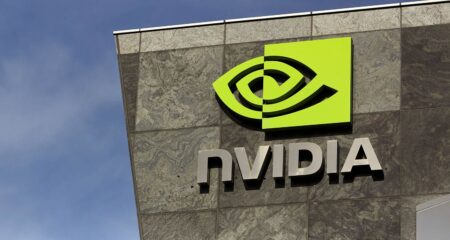
Taiwan’s Asustek Computer plans to introduce one of the first services that lets companies tap into the potential of generative artificial intelligence while keeping control over their data.
The novelty of the Taipei-based firm offering, called AFS Appliance, is that all of the hardware will be installed in the client’s own facilities — to maintain security and control. The AI computational platform, built on Nvidia’s chip technology, will be operated and updated with new data by Asustek, better known as Asus.
A major concern around services like OpenAI is that they’re operated through online data centres that can expose sensitive information. Samsung Electronics banned employees from using OpenAI’s ChatGPT after it found workers had uploaded sensitive code to the platform.
Asus will preload the AFS hardware with its own large language model, called Formosa, which it says is equivalent to ChatGPT 3.5 and trained in traditional Chinese. The company aims to price the service at around US$6 000/month, Asus Cloud and TWS president Peter Wu said in an interview on Monday.
The highest-spec offering, which adds an Nvidia DGX AI supercomputer platform, will cost around $10 000/month, he said. Partnering with a local telecommunications company, Wu aims to have 30 to 50 enterprise customers in Taiwan and expand internationally by the end of this year.
“Nvidia are a partner with us to accelerate the enterprise adoption of this technology,” Wu said. “Before ChatGPT, enterprises were not aware of why they need so much computing power.”
‘Smart brain’
Most businesses will deploy generative AI on their own premises due to sensitivity about access to their proprietary data, according to Wu. “They need a smart brain to be under their own control and management, as it will touch on the most sensitive data,” he said.
Recently returning from a trip to Singapore, Asus’s cloud chief says he sees a lot of interest from banks and hospitals. In the clinical context, generative AI would help doctors document treatments and patients visits quicker, while also helping communicate diagnoses in more relatable language to patients. One potential customer, a large legal firm, told Wu its priority is to have regularly refreshed data, which is part of the company’s service.
Read: Nvidia: too rich even for Cathie Wood
Nvidia’s stock has skyrocketed due to demand for its AI-training chips, though firms like Asus will seek to carve out a share of the market for themselves by offering holistic AI systems. There’s no supply shortage of Nvidia’s A100 chips, which run the AFS Appliance, Asus’s Wu said, and the existing partnership between the companies is helping ensure that Asus will have all the firepower it needs to roll out its new offering. — (c) 2023 Bloomberg LP




